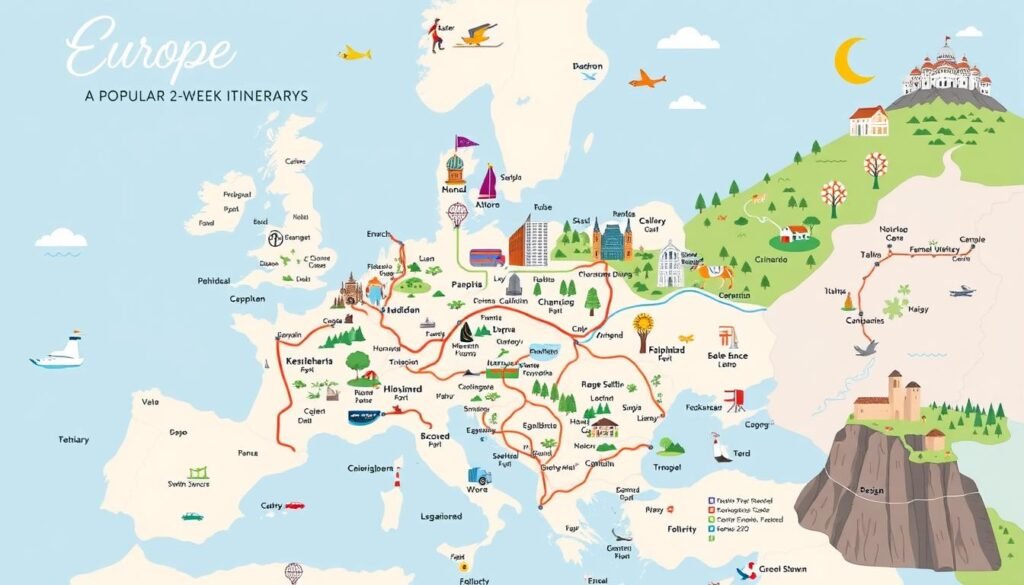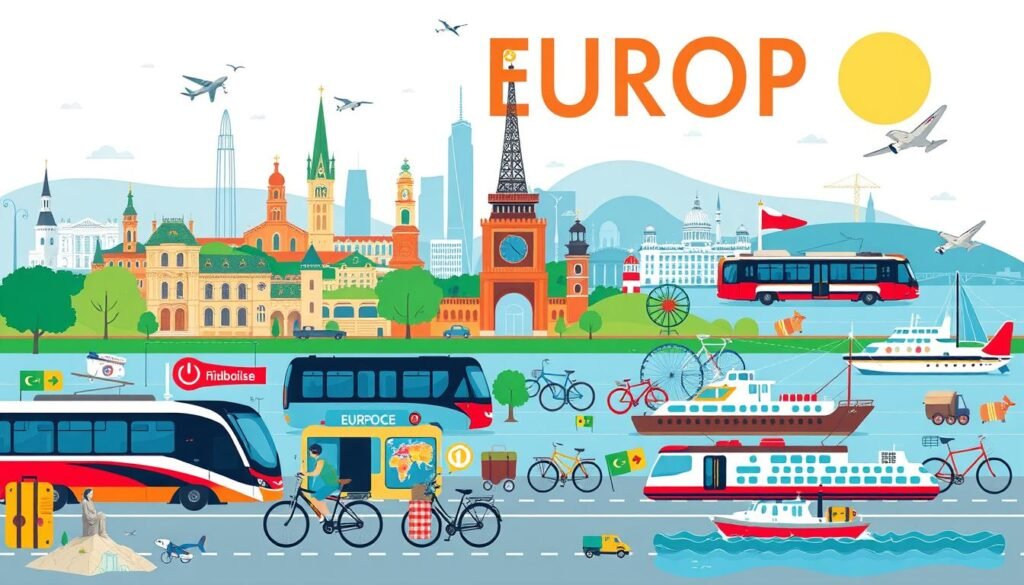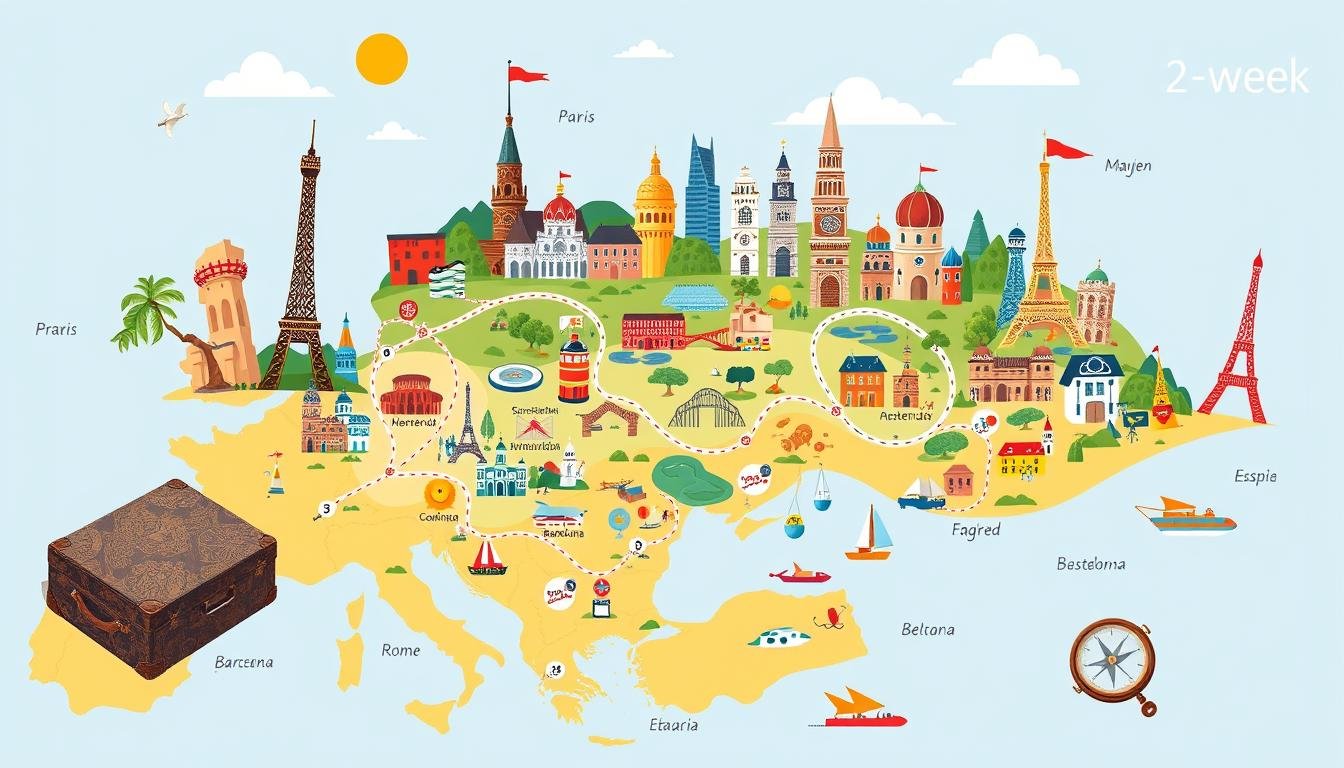Planning a 2-week trip to Europe is exciting but can be stressful, especially when figuring out how to travel Europe for 2 weeks effectively. With so many places, sights, and experiences to choose from, it’s easy to feel overwhelmed.
This comprehensive guide will help you navigate the complexities of how to travel Europe for 2 weeks, ensuring you plan an amazing and unforgettable European adventure.
Key Takeaways
- Explore the most popular 2-week Europe itinerary options
- Discover tips for finding affordable flights and navigating transportation
- Uncover the best accommodation options and budgeting advice
- Learn how to create a balanced and efficient 2-week Europe trip
- Consider alternative 2-week Europe itinerary ideas for a unique experience
Introduction
Planning a 2-week Europe trip is exciting but needs careful planning. This guide will help you plan an amazing 2-week Europe trip. You’ll learn how to choose your destinations, book travel, and find places to stay.
Importance of Planning a 2-Week Europe Trip
Going on a 2-week Europe trip is an adventure. But, you need to plan well to enjoy it. By planning, you can see the best sights and dive into different cultures. Good planning helps you stay within your budget and manage travel and lodging.
Outline of the Ultimate Guide
This guide will cover important planning steps for a 2-week Europe trip:
- Choosing your 2-week Europe itinerary and popular places
- Getting travel documents like passports and visas
- Booking flights and figuring out Europe’s transport
- Finding great places to stay and budgeting
- Packing for a 2-week Europe trip
- A suggested 2-week Europe itinerary with daily tips
- Other 2-week Europe itinerary options
- How to save money on your trip
- Enjoying European cultures and food
- Travel advice and safety tips
Follow this guide to plan an amazing 2-week Europe trip. You’ll explore the continent’s history, cities, and cultures.
Deciding on Your 2-Week Europe Itinerary
Planning a 2-week Europe trip needs careful thought. You must think about what you want to see and do. Also, the best time to visit can affect your trip and how much you spend.
Factors to Consider When Planning Your Route
- Your personal interests and must-see destinations
- The best time of year to visit your chosen locations
- Proximity and transportation options between cities
- Budgeting for flights, accommodations, and activities
- Balancing iconic landmarks with off-the-beaten-path experiences
- Allowing enough time in each destination to fully immerse yourself
Popular 2-Week Europe Itinerary Options
Some top 2-week Europe itineraries include:
- London, Paris, and Amsterdam
- Lisbon, Madrid, and Barcelona
- Rome, Florence, and Venice
- Prague, Vienna, and Budapest
- Oslo, Stockholm, and Copenhagen
These itineraries let you see different parts of Europe in 2 weeks. The cities you pick depend on what you like and how you travel.

Obtaining Necessary Travel Documents
Before you start your 2-week Europe trip, make sure you have all your travel documents ready. As a US citizen, you need a valid passport with at least 6 months left before it expires. Getting a new passport or renewing an old one can take up to 6 weeks, so start early.
You might also need a Schengen visa if your country requires it. The Schengen area, which includes many European Union countries, lets US and Canadian citizens stay for up to 90 days in 180 days without a visa. But, starting in 2025, you’ll need to get an ETIAS visa waiver to enter the Schengen zone.
- The cost of a US passport is $130, with an extra $35 for the acceptance fee.
- Renewing a US passport costs $130, with no extra fee.
- For minors under 16, a passport costs $100, plus the $35 acceptance fee.
- An International Student Identity Card (ISIC) costs $20 for a virtual card and $25 for a physical one.
- An International Driving Permit costs $20 plus tax and is needed for driving in some European countries.
It’s important to research and get these documents early to avoid any problems on your 2-week Europe trip. By getting all the europe travel documents required ahead of time, you can enjoy your how to get europe travel documents journey without stress.
“Proper planning and preparation are the keys to a successful and stress-free European vacation.”
Booking Flights and Transportation
Planning a two-week European trip starts with booking flights and transport. To find affordable Europe flights, here are some tips:
- Be flexible with your travel dates to find cheaper fares. Changing your trip by a day or two can save a lot.
- Use flight search engines like Google Flights and Skyscanner to compare prices. This helps you find the best deals.
- Try flying into secondary airports. They are often cheaper than big hubs.
- Look for red-eye or early morning flights. They are usually more affordable.
- Sign up for airline and travel alerts. This way, you won’t miss out on sales and promotions.
After arriving in Europe, you’ll need to figure out how to get around. You can use trains, planes, or cars. Here are some options:
- High-speed trains like the Eurostar and TGV are great for traveling between cities.
- Budget airlines like Ryanair and EasyJet offer cheap flights between major cities.
- Renting a car gives you freedom to explore the countryside.
- Using a mix of trains, planes, and cars can make the most of your time.
| Transportation Option | Pros | Cons |
|---|---|---|
| High-speed Trains | Efficient, comfortable, and scenic | Potentially more expensive than low-cost airlines |
| Budget Airlines | Affordable, convenient for quick point-to-point travel | Baggage fees, limited leg room, and less flexibility |
| Rental Cars | Provides freedom to explore at your own pace | Navigating unfamiliar roads and parking in cities can be challenging |

“Combining different modes of transportation is often the most efficient way to get around Europe during a two-week trip.”
Accommodation Options for Your 2-Week Europe Trip
Planning your 2-week Europe trip means thinking about where you’ll stay. Europe has many choices, like cozy hostels and fancy hotels. Knowing the good and bad of each helps you pick the right one for your budget and how you like to travel.
Hotels, Hostels, and Vacation Rentals
Hotels are a popular pick for staying in Europe. They offer comfort and lots of amenities. You can find hotels that are cheap or very expensive, depending on what you want.
Hostels are great for those who want to save money. They have dorms and shared spaces. They’re perfect for meeting new people, especially if you’re young.
Vacation rentals, like Airbnb and Vrbo, let you stay in homes or apartments. This way, you can live like a local and have more room and things to use.
Budgeting for Accommodations
Accommodation costs can add up fast on a Europe trip. To stay within your budget, look up the average prices for where you’re going. Think about staying in hostels or vacation rentals for cheaper options.
Also, book early and look for deals. Some hotels and websites offer discounts if you book early. Remember, there might be extra fees like taxes and service charges. So, add those to your budget too.

“Striking a balance between comfort, convenience, and cost is key to planning a successful 2-week Europe trip.”
By knowing your options and budgeting well, your 2-week Europe trip can be both fun and affordable.
Packing Essentials for a 2-Week Europe Adventure
Getting ready for a 2-week trip to Europe means picking the right items. You want clothes and accessories that are comfy and can be worn in many ways. This way, you can pack light and still look great.
Begin with versatile, layerable clothing for different weather. Include comfortable jeans and neutral tops. Add a lightweight jacket for warmth. Remember a waterproof outer layer like a rain jacket for rainy days.
Choosing the right shoes is key. Wear sturdy, supportive walking shoes for long walks. Slip-on sneakers or ankle boots are good for both casual and dressier days.
- Travel documents, ID, and a secure money storage solution
- Chargers, adapters, and a portable power bank to keep your devices charged on the go
- Toiletries and any necessary medications
- A lightweight, collapsible daypack or purse for carrying essentials during day trips
Packing light makes your trip more enjoyable. Check out the packing guide for more tips to make your luggage lighter.
| Item | Quantity | Justification |
|---|---|---|
| Jeans | 1-2 pairs | Versatile, comfortable, and suitable for various occasions |
| Tops | 5-7 | Mix of short-sleeved, long-sleeved, and dressier options for layering |
| Outerwear | 2 items | A lightweight jacket or cardigan, plus a waterproof rain jacket for changeable weather |
| Shoes | 3 pairs | Comfortable walking shoes, slip-on sneakers, and a dressier option like ankle boots |
| Accessories | 1-2 items | Scarf, hat, or statement jewelry to add variety to outfits |
Following this packing list makes your 2-week Europe trip easy. You’ll have room for souvenirs and new finds.
How to Travel Europe for 2 Weeks
Suggested Itinerary: Amsterdam, Paris, Barcelona, and Rome
A popular 2-week Europe trip itinerary takes you to Amsterdam, Paris, Barcelona, and Rome. You’ll dive into the history, culture, and beauty of these cities.
- Days 1-3: Explore Amsterdam’s canals, museums, and lively vibe. Don’t miss the Anne Frank House, Rijksmuseum, and Vondelpark.
- Days 4-7: Discover Paris’s culture and food. See the Eiffel Tower, Notre-Dame, and the Louvre. Don’t forget Versailles Palace and Gardens.
- Days 8-10: Enjoy Barcelona’s Mediterranean feel. See Gaudí’s work, explore the Gothic Quarter, and relax on the beaches.
- Days 11-14: Learn about Rome’s ancient history and architecture. Visit the Roman Forum, Colosseum, and Vatican City. Wander Rome’s streets.
Day-by-Day Breakdown and Activity Recommendations
Here’s a day-by-day guide for your 2-week Europe itinerary:
- Day 1: Arrive in Amsterdam, see its canals and buildings.
- Day 2: Visit the Anne Frank House, Rijksmuseum, and Vondelpark.
- Day 3: Check out the Van Gogh Museum and the Red Light District.
- Day 4: Head to Paris, explore in the afternoon.
- Day 5: See the Eiffel Tower and Notre-Dame Cathedral.
- Day 6: Visit the Louvre Museum and Arc de Triomphe.
- Day 7: Go to Versailles Palace and Gardens.
- Day 8: Fly to Barcelona, explore the Gothic Quarter and Las Ramblas.
- Day 9: See Gaudí’s Sagrada Familia.
- Day 10: Visit Montjuïc Hill and enjoy the beach.
- Day 11: Fly to Rome, see the Roman Forum and Colosseum.
- Day 12: Visit the Vatican City, including St. Peter’s Basilica and the Sistine Chapel.
- Day 13: Explore Rome’s streets, visit the Trevi Fountain.
- Day 14: Depart for your next destination or home.
This 2-week Europe itinerary lets you see famous places and make lasting memories. Plan ahead and stay flexible to enjoy your Europe trip itinerary 14 days.
Alternative 2-Week Europe Itinerary Options
There are many ways to see Europe in 2 weeks, not just the usual spots. Let’s look at two new paths: Central Europe and Northern Europe. Each offers a unique view of Europe’s beauty.
Central Europe: Prague, Vienna, and Budapest
For a different 2-week trip, try Central Europe. Visit Prague, Vienna, and Budapest. You’ll dive into history, culture, and grandeur.
In Prague, see amazing buildings and lively squares. Don’t miss the Charles Bridge and Prague Castle. Next, Vienna awaits with palaces, museums, and music. End in Budapest, with its stunning views, nightlife, and history.
Northern Europe: Oslo, Stockholm, and Copenhagen
For a Northern Europe trip, see Oslo, Stockholm, and Copenhagen. You’ll love the fjords, streets, and cozy lifestyle of Scandinavia.
In Oslo, enjoy museums, modern sights, and nature. Then, Stockholm’s streets and islands are yours to explore. Finish in Copenhagen, with its canals, food, and cozy vibe.





